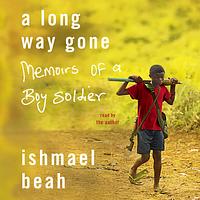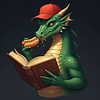Take a photo of a barcode or cover
Great book, but deeply disturbing for its graphic violence. It's an honest portrayal of wartime atrocities, and while I'm glad nothing is glossed over, I found it extremely unsettling - to the point where sometimes I had to put the book down.
adventurous
dark
emotional
hopeful
inspiring
reflective
sad
tense
medium-paced
Told in a very plain style, this memoir reads almost like a transcript of an oral narrative. Occasionally, it comes across as rambling, but at other times Beah deftly manages to interweave not just his life as a child soldier, but also Sierra Leone's diverse culture, from plant lore to myths, into the fabric of his story.
In fact, though the subtitle of this memoir might suggest A Long Way Gone is just about being a boy soldier, the first half of the book actually documents how Beah initially avoided that fate, as he travelled around Sierra Leone, fleeing the encroaching rebels, looking for safety and his family. It is a eulogy for lost childhood, for a country at war with itself, as rituals and traditions become lost in the blood splatter.
The pointless savagery and cruelty is nauseating. The author carefully documents the shattered skulls, the bloody fragments of flesh, the corpses burnt to unrecognisable charcoal.
When Beah and his friends are eventually recruited by the army to fight the rebels, the boys are reduced to little more than savage animals by a combination of violence and drugs. The middle section of the book, where the author describes being a child soldier, is relatively short, passing by in a haze of cocaine, marijuana, 'brown brown' and blood. Most of this period is later relived in flashback, when Beah emerges from the fog of bloodlust to what he initially describes as 'sissy' civilian life.
The final section is an unvarnished account of PTSD, survivor guilt and residual anger towards those whose pity feels patronising and superficial.
Through all this, the reasons for the Sierra Leone civil war are never mentioned. In the context of this memoir, it's utterly irrelevant, because could any cause justify the widespread massacre of civilians and the corruption of pre-teens into child soldiers? This is not a book about the beliefs of the people leading one side or the other, but the effect their wars have on the innocent populace.
The front cover of the edition I read had a quote from the Washington Post saying that this memoir should be read by everyone in the world. I agree, just as I think as many people as possible should watch the documentary For Sama, about the Syrian civil war. Neither that film nor this book are great works of art, but they are important testimonials that should be experienced, in order to make us all a little more compassionate, a little more humane and a little more informed about the brutal nature of civil war.
In fact, though the subtitle of this memoir might suggest A Long Way Gone is just about being a boy soldier, the first half of the book actually documents how Beah initially avoided that fate, as he travelled around Sierra Leone, fleeing the encroaching rebels, looking for safety and his family. It is a eulogy for lost childhood, for a country at war with itself, as rituals and traditions become lost in the blood splatter.
The pointless savagery and cruelty is nauseating. The author carefully documents the shattered skulls, the bloody fragments of flesh, the corpses burnt to unrecognisable charcoal.
When Beah and his friends are eventually recruited by the army to fight the rebels, the boys are reduced to little more than savage animals by a combination of violence and drugs. The middle section of the book, where the author describes being a child soldier, is relatively short, passing by in a haze of cocaine, marijuana, 'brown brown' and blood. Most of this period is later relived in flashback, when Beah emerges from the fog of bloodlust to what he initially describes as 'sissy' civilian life.
The final section is an unvarnished account of PTSD, survivor guilt and residual anger towards those whose pity feels patronising and superficial.
Through all this, the reasons for the Sierra Leone civil war are never mentioned. In the context of this memoir, it's utterly irrelevant, because could any cause justify the widespread massacre of civilians and the corruption of pre-teens into child soldiers? This is not a book about the beliefs of the people leading one side or the other, but the effect their wars have on the innocent populace.
The front cover of the edition I read had a quote from the Washington Post saying that this memoir should be read by everyone in the world. I agree, just as I think as many people as possible should watch the documentary For Sama, about the Syrian civil war. Neither that film nor this book are great works of art, but they are important testimonials that should be experienced, in order to make us all a little more compassionate, a little more humane and a little more informed about the brutal nature of civil war.
At times I felt myself wanting more from the author. I feel awful for saying that because what he went through is unthinkable. At times it didn't even feel like something like that could be real. I just feel like he left out a lot about some parts of his life that would of made it easier for me to understand sections of this book. The end was also a little strange to me, it felt hurried and unresolved.
challenging
emotional
hopeful
informative
inspiring
challenging
dark
emotional
inspiring
sad
medium-paced
I read this book on the plane after returning back to the United States after visiting Sierra Leone. I was fortunate enough to visit Mattru Jong, Bonthe Island, and Freetown with a friend who is from there. So many details felt inescapably real after seeing the places where events happened in this book. That being said, I'm very happy that I read this book after visiting. I think the scars from the civil war are there if you look for them, but Sierra Leone is so much more than the tragedies that have affected the people who live there. The people who live there are some of the friendliest, optimistic people I have ever met. I've learned that the bare ingredients needed to live a fulfilling and happy life is so much simpler than you would expect. I would highly recommend this book because there are horrors and redemptions that are grander than any fiction I have read. However, please see that there is so much more to Sierra Leone than this. The areas where these events happened are some of the most beautiful I have seen. The people I have met are delightful and deserve to be seen for who they are and not just the events that have happened.
Very difficult to read- an unfathomably traumatic childhood and a terrible, un-win-able situation for any person- let alone a child- to be thrown into. But incredibly important and thought-provoking. What was most striking to me was how he and his friends were treated like criminals before they ever fought- when they were just boys also fleeing the rebels and trying to find their families. I don't think it's too heavy-handed to say that I could see parallels to other young men in other societies who are feared and criminalized before any wrongdoing. I've seen reviews here that say there should have been more stories of the fighting and I couldn't disagree more. The acts of war committed are not the point- it's more about his innocence before and the rehabilitation at the end. So very terrible- but so very important to know about. Really graphic at times, so not for the faint hearted.


